The Right Tools Revelation
Posted by Robin Childs on April 28, 2014 News | Tags: art, supplies, tips, tools | No comments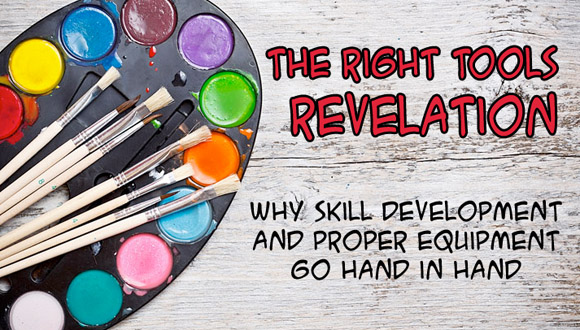
I have the strangest revelations about art when I’m washing dishes.
Looking down at my soap-slicked hands as they held the sponge, slightly red from the just-under-scalding water, I marveled at the dynamic that exists between skill and tools. While I could spend all my life perfecting my dishwashing technique, if I did not have a sponge with which to do the task, I would not be as effective at it. I might develop certain techniques to get the job done well, but it would likely never be as quick or as effective as I’d be with the sponge. For me to attain true dishwashing mastery, both honed skill and the proper tool must be present.
The same is true for art.
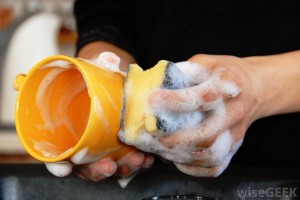
There’s a common experienced artist lament that goes something like this:
The experienced artist is approached by a young beginner. Instead of inquiring about the techniques or influences, the youngster bores in on what program the artists uses, or the type of pen. Exasperated, the seasoned artist veteran rails, “Forget about the program or the pen, that’s not going to magically make you a pro! Study anatomy and color theory and composition! Draw every single day! Don’t worry about what you use to do it, just make art!”
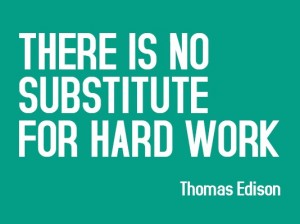
And I get where they’re coming from, because until I was overwhelmed by the majesty of sponges, I subscribed to that school of thought too. I think it stems from a frustration with the “You’ve got so much talent” approach that an outsider has to the process. People seem to think that most artists and writers just magically awakened one day with their skills fully formed. (As an instructor for eight year olds, I can assure you that this is exactly how most of them perceive what I do. I think by the time they reach their teens, they’ll have graduated to the ‘you sold your soul’ school of thought instead.) What few recognize is that most art — whether you’re a writer, painter, dancer — comes from a great deal of dedication, hard work, and study. So when somebody asks “What tools do you use?” it’s easy to hear that question as “What magic wand do I need to buy to join the Hogwarts School of Artistry?”
That can be a particularly discouraging question to hear after you’ve put in your decades of toil. Especially when the world tends to approach artists as lazy and eccentric vagabonds that don’t know how to get a real job because they’re too busy indulging their inexplicably vast talent.
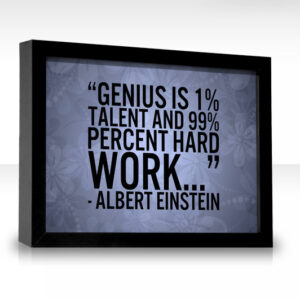
Yet I think neglecting the equipment side of the equation does a disservice to both experienced pro and fledgling hopeful. Mainly because it creates the illusion that every artist will respond to every tool and every medium with equal passion. If only the practiced skill matters, then a painter should be a painter of equal skill regardless of watercolor, acrylic, or oil.
I have found that it simply isn’t so.
My understanding of color theory and composition and form will remain the same regardless of the medium, but my enjoyment and ability to apply that skill will not. For example, I enjoy painting with acrylics. Oil, on the other hand, drives me up the wall. And don’t even get me started on watercolors!
Inking is another example. For nearly a decade now, I have inked my own comics. And for the entirety of that time, it was the task I liked the least. In fact, I would go as far to say that I found inking to be a loathsome and tedious experience that, no matter how hard I tried, yielded at best mediocre results. No matter how many extra hours I poured into trying to improve my technique, the response would come back from viewers, “You need to improve your lifework.” Finally, in a fit of pique, I demanded of my artist friends, “FINE! If you think lifework is so great, why don’t you tell me what you use?”
Lo and behold, I was introduced to a special inking brush. And now I look forward to inking with every page. It may even be my favorite part of the process. And overnight my inks have gone from criticized constantly to frequently complimented.
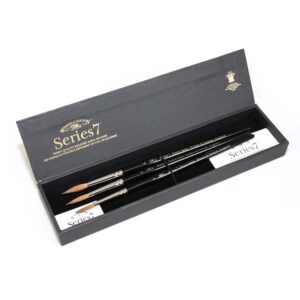
The tools matter. Having the right tools for the right job can make the difference between a painful and pleasurable experience. If I had only tried oil painting, I might have quite rationally concluded that painting wasn’t for me. (In fact, I did for several years.) If I wasn’t so darn stubborn, I probably would have made the same conclusion about inking. Maybe I would have stopped working on comics all together.
Getting access to the tool and the medium that works best with one’s unique personality and way of viewing the world can connect a person to their passion. It can take a task that seems impossible and frustrating, and turn it into one of wonder and excitement. It can light the spark and make the necessary practice and hard work into something enjoyable. We don’t have to suffer in order to grow. Not all learning must come from pain.
So instead of fussing at a student for asking about the tools, the next time I’m asked about the pens and programs, I’m going to discuss the nitty gritty without frustration. Maybe I can direct that aspiring artist to a pen that will make them fall in love with inking. Perhaps I can help them pursue their passion in a way that isn’t quite so painful as the road I had to take. At the very least, I can encourage them to explore lots of different options. Since they have to put in the practice and study and hard work anyway, why not have a little fun experimenting along the way?
Or perhaps I should just tell them to wash more dishes at home, and let the artistic revelations come to them. I’m sure there’s somebody in their household that would appreciate the extra help.
